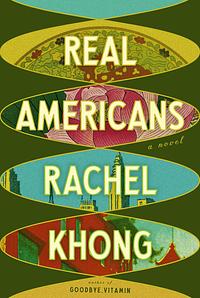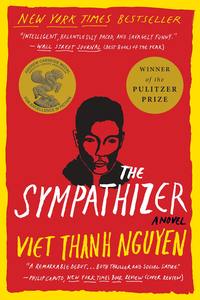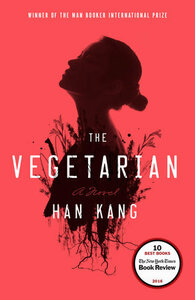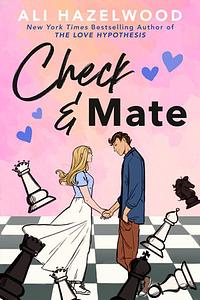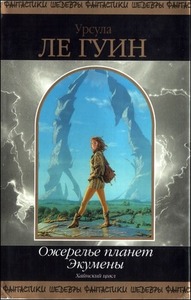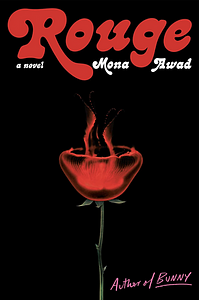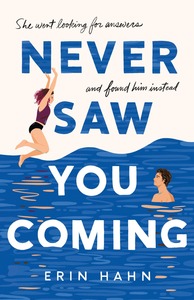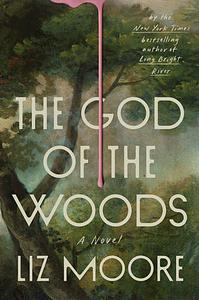Take a photo of a barcode or cover
documentno_is's Reviews (1.28k)
challenging
emotional
reflective
tense
fast-paced
Plot or Character Driven:
A mix
Strong character development:
Yes
Loveable characters:
Yes
Diverse cast of characters:
Yes
Flaws of characters a main focus:
Yes
Real Americans is in regards to its title, tangentially a book about the American Dream. By that I mean the true American dream- the desperate immigrant story of searching for things that weren't possible in their country of origin always in conflict with privilege, whiteness, and wealth. This novel is about intergenerational relationships- both in positive ways and the ways they fail. It's a book about desires and how they change and stay the same as time passes. It is a book about forgiveness, hope, and longing. While this book has a really lofty concept- its execution is extremely personal and emotional.
Part 1- Lily
Part one of this novel was my favorite, as Lily's story of belonging and conflict with her parents dreams and ideals was deeply empathetic to me.Lily confronts her own experience and how it differs from that of Matthew's- hoping but not ultimately believing that love is enough to carry you through. In a lot of ways Lily is the most sympathetic character in this novel, and in much of the events of the plot happen to her and not in her orchestration.
Part 2- Nick
Nick is the lesson that Lily and Mei both need- no matter what choices and desires you have your child will always make their own. You can't will someone into believing the things you do or sympathizing with the same betrayals and so in Nick's chapters you see him learn his own lessons.
Part 3- Mei
As different as Lily believes them to be-both Lily and Mei choose pragmatism over love and Mei's choices ultimately lead to her separation and alienation from her family. I loved the contrast where Mei talks about how much more important her ambition was to her but by the time she was older the only thing she really wanted was her relationship with her daughter and grandson.
Eugenics
This novel uses DNA altering and the science of genetics to talk about race, intelligence, and circumstance in how they relate to the American experience. Would a parent give their child privileges they couldn't experience if it meant fundamentally changing who they are? We see the different ways this plays out in this novel and learn the different ways the characters view the world through this lens.
Time
Time was an interesting component in this novel because we are given an almost supernatural treatment toward the passage of time- and then imply this somehow has genetic origins. This behavior is never really explained to the reader but we know all characters in this family struggle with the ability to process time and we don't know how magical our reading experience really is. It could be as simple as a more floral way of describing the experience of ADHD- we never really get answers to this phenomenon but know firmly by the end that all the characters wish they had more time.
Politics
This novel takes a sort of liberal/nothing stance on the politics of eugenics and how they relate to Mei's experiences in communist China. The portrayal of China in this novel is a very typical 1st generation immigrant portrayal, and takes some anecdotal liberties.
I recommend this novel for people who want to read about the American experience, wealth & class issues, and like strong and dramatic character stories.
Part 1- Lily
Part one of this novel was my favorite, as Lily's story of belonging and conflict with her parents dreams and ideals was deeply empathetic to me.
Part 2- Nick
Nick is the lesson that Lily and Mei both need- no matter what choices and desires you have your child will always make their own. You can't will someone into believing the things you do or sympathizing with the same betrayals and so in Nick's chapters you see him learn his own lessons.
Part 3- Mei
As different as Lily believes them to be-
Eugenics
This novel uses DNA altering and the science of genetics to talk about race, intelligence, and circumstance in how they relate to the American experience. Would a parent give their child privileges they couldn't experience if it meant fundamentally changing who they are? We see the different ways this plays out in this novel and learn the different ways the characters view the world through this lens.
Time
Politics
I recommend this novel for people who want to read about the American experience, wealth & class issues, and like strong and dramatic character stories.
challenging
dark
In many ways this novel feels less like a novel and more like an interesting essay on the realities of the Vietnam War from the perspective of (maybe either a socialist or neoliberal?) person who takes a critical lens at both sides. The reader expects this both sides take because they are introduced at the very beginning to our titular character, a half Vietnamese communist spy. This book focuses on Vietnamese representation in media, life as refugees in America, the role of America in the revolution, and then finally in the last chapters in Vietnam.
I appreciated the way this novel asks the age old question, how can you force a revolution on a public? How can communism exist when its participants are unwilling? The narrator does not have the answers to these questions, only more questions and a deep hatred for the American War Machine.
For the entirety of the novel the tongue in cheek satirical tone takes a hard turn at the end, becoming deeply graphic and violent in its imagery. This was effective at showing the reader the reality of the cruelty and images while still keeping hold of the agency of the narrator, disallowed from becoming another faceless nameless tragedy for the American public to consume we are given only complex and many times irreconcilable human beings.
I think while the book attempts to take a feminist role in showcasing the lives and realities of Vietnamese women, this is the one aspect it really fails in. Women only have roles in this novel, they are hardly characters. It also suffers from a case of the Madonna or Whore phenomenon, and I struggled with both the main character's treatment of women but also the novel's literal displays of graphic violence. I think in a lot of ways this blindspot serves the titular character's characterization but it leaves the reader with a slight distrust of the author, and question's his ability to write female characters.
I know to some extent this novel is satire, and furthermore that we are supposed to find the sex scenes indicative of the loneliness and alienation our protagonist feels at being half French & half Vietnamese but… sigh. Every author by a man that ends up reaching some level of critical renown always has some sexual awakening scene that is supposed to shock or disturb the reader in some way, in this case I think its intended to fit into the comedic portions of this book? The prose itself dealt with the situation humorously but I’m going to be honest, I didn’t need it ! Leave the poor squid alone lol If anything it distanced me from the character and only sought sow seeds of mistrust between me and the author’s voice. Even Mrs. Mori who is supposed to be seen as a liberated woman, is only seen through the character's eyes as a potential lover. Her complexity nearly completely stripped away at the end, when she decides to pursue another man other than our protagonist.
This facet aside, this book taught me things I never knew in interesting ways. I liked how the author used the language of the world to talk about scenes, “Empty beer cans surrounded him like bullet casings” after they had just escaped war torn Vietnam for America. I think it can be almost unanimously decided by the public at this point that The Vietnam War was ineffectual, useless, and an embarrassment for America; in this way it acts as the perfect stage for this double agent character with incredible empathy that is just trying to survive.The themes espoused by this novel remind me much of my parent's ideals- having also left a communist country (USSR) their feelings were extremely critical of America but also of their previous regime, in essence they ended up believing in nothing but survival which is almost exactly where our main character is left by the end of the book.
I recommend this book for those that don't know much about the Vietnam War who are looking for a Vietnamese American perspective on it.
I appreciated the way this novel asks the age old question, how can you force a revolution on a public? How can communism exist when its participants are unwilling? The narrator does not have the answers to these questions, only more questions and a deep hatred for the American War Machine.
I think while the book attempts to take a feminist role in showcasing the lives and realities of Vietnamese women, this is the one aspect it really fails in. Women only have roles in this novel, they are hardly characters. It also suffers from a case of the Madonna or Whore phenomenon, and I struggled with both the main character's treatment of women but also the novel's literal displays of graphic violence.
I know to some extent this novel is satire, and furthermore that we are supposed to find the sex scenes indicative of the loneliness and alienation our protagonist feels at being half French & half Vietnamese but… sigh. Every author by a man that ends up reaching some level of critical renown always has some sexual awakening scene that is supposed to shock or disturb the reader in some way, in this case I think its intended to fit into the comedic portions of this book? The prose itself dealt with the situation humorously but I’m going to be honest, I didn’t need it ! Leave the poor squid alone lol If anything it distanced me from the character and only sought sow seeds of mistrust between me and the author’s voice. Even Mrs. Mori who is supposed to be seen as a liberated woman, is only seen through the character's eyes as a potential lover. Her complexity nearly completely stripped away at the end, when she decides to pursue another man other than our protagonist.
This facet aside, this book taught me things I never knew in interesting ways. I liked how the author used the language of the world to talk about scenes, “Empty beer cans surrounded him like bullet casings” after they had just escaped war torn Vietnam for America. I think it can be almost unanimously decided by the public at this point that The Vietnam War was ineffectual, useless, and an embarrassment for America; in this way it acts as the perfect stage for this double agent character with incredible empathy that is just trying to survive.
I recommend this book for those that don't know much about the Vietnam War who are looking for a Vietnamese American perspective on it.
adventurous
challenging
dark
mysterious
reflective
tense
fast-paced
Plot or Character Driven:
A mix
Strong character development:
Complicated
Loveable characters:
No
Diverse cast of characters:
No
Flaws of characters a main focus:
Complicated
Ice is difficult to read and hard to follow from a traditional narrative structure- so I suggest abandoning adherence to structure and immersing yourself in the world and images as the author intends. You will feel more than you think- and not always feel in positive ways. I think this author’s style is one of my favorites I’ve read in a long time. I suggest this novel to those looking for heavy handed style, dream like narratives, and ventures into the surreal. Below I've attached my thoughts on the novel in regards to its separate parts.
The Girl
His obsession with his former lover is mainly presented in this “dream” in which he sees her frozen over by malicious ice. The way the reader is presented the dream is undistinguishable from the reality the narrator also presents us, which the narrator then explains is how the dreams come on.
From this dream, we also learn of the narrator’s propensity for cruelty. He suffers terrible insomnia, likes to watch the girl that left them suffer in his hallucinations, and is exploring unknown weather phenomenon in a specific country.
Her Husband
The narrator presents us with two contrasting realities both mirroring each other. There is his first visit in which the amicable husband tries to regain peace between the girl and him (but with an almost murderour outburst on some ruins.) This then contrasts the later visit in which he comes uninvited and sees the husband has become cruel and abusive, taking on the qualities of the weather outside. It’s as if the characters are driven not only by their psychological motivations but the physical reality of their setting.
Part 2
In the first sentence we come to know the age of the girl in question, who is uncomfortably young to be at the hands of both our narrator and her husband who seem much older. We don’t know how much bearing this has on the story because while we know we might be in some foreign country- we don’t know where only that it is frigid and icy and we don’t know much about the time period other than that cars are within the setting.
Obsession
The narrator and his obsession with the girl are a central theme of the story. As the obsession grows we see the narrator become more energetic- he seems to have little knowledge of the origin of his obsession but the reader can assume it is born of something like rejection.
The narration shifts often between settings and time period that invokes a dreamlike and surreal quality that props up the narrator’s hallucinations. We are reminded of his headaches periodically as well. The dreams always involve some aspect of the natural environment turning on the girl and restricting or capturing her in some torturous way.
The narrator spends some time relating us to some nuclear/climactic event but is vague about the nature. It seems an important foreshadowing event to the ice and brutality of the story at hand. It is hard to relate whether it’s using the personal as a window for some greater societal or political theme or the reverse.
The Chase
The rising tension of the story is driving us both closer and further from the girl, in some ways the narrator realizes her importance to him but also resents it. He finds her on a ship but he is taken off the ship and she sails away; still, this seemingly reignites his desire to track her down. Despite having lost sight of the girl on the previous ship we are now once again in sight of the girl, although the narrator little knows if it’s her or not but makes a rash decision to follow her off board with some secret police.
Part 3
We learn quickly of some secret police type government system that the town seems to have in place as its government- we heard the warden was of importance on the ship in the previous section but begin to amass clues in tracking him down. We also hear that there may be some kind of dragon living in the water which fits fell into the stories sense of fantasy. We are never quite certain of our narrator’s grip on reality and then furthermore if this world is 1. A true place in perhaps northern Eastern Europe somewhere 2. A made up location with its own distinct set of rules and conditions that acts as an allegory for some aspect of reality or 3. A literal fantasy crafted of ice. All we have are our persistent visions of ruins, the unbearable cold and inability to get warm. ( this is an aside but in some ways this story reminds em a little of the less comedic version of that snl skit where John Hamm is trapped in a car and can’t seem to get warm. )
Repetition
Once again in this part we have the repetitive narrator’s cyclical thoughts in regards to the girl, her silver hair, and her mother’s abuse. The repition makes us question our narrator’s sanity along with the headaches, the war torn environment, and the bleak surroundings.
Sometimes the story projects itself into character’s actions that we as the narrator’s consciousness should not know- we are the warden oppressively over the girl in the bed not the narrator looking for her. We are watching the girl and her husband’s marriage disintegrate when we know our narrator has already left in the car going back home.
With complete lack of transition we are leaving the warden’s perspective back into our narrator’s journey to see the warden. We ( the reader) don’t know if we are being given some premonitory vision into the goings on that the narrator is not privy to or if we are the narrator’s fanatical imaginations torturing the girl continuously in his mind.
Part 4
Our narrator is now feigning interest in the town, while also relating to his pervious fixation of the singing lemurs. This part seemed largely based in some reality where he is semi-imprisoned in this town by the warden. He knows he might have his friend in the building, but has laid no physical eyes on her. We learn the warden wants our narrator to exert his political influence in favor of the warden’s town.
Part 5
At first this narrative continues in previous fashion, our narrator seeks the girl while also being interspersed with visions of her in terror. Then, we are thrust into a war slaughter- the town is being attacked by some kind of vicious people who seek to pillage and destroy everything in sight.
This finally leads us up to the climax of the novel: the ending which is both inevitable and tragic. Our narrator finds our girl murdered viciously and left mangled outside. He laments not being able to be the one to torture her in this fashion. Still then in the next scene the girl is being spoken of as if alive, the village contemplates having her sacrificed and our narrator balks in horror of their savagery-all the while forgetting he has been dreaming of torture since part 1. It is also interesting that we see here our narrator in a foreign “savage” land yet have none of the barriers of communication we would expect- this fits well with the half-impossible half-dream like state of the novel’s tone.
The story is now almost absurd in playing with time- we are once again the narrator writing about the lemurs- going about daily motions int he safety of his room. Then once again he is wading through wreckage and death to find the girl. In some ways I feel like the narrator/writer of this story is “tricking us” over and over again. He plays with the idea of our 1. Wantign to find out what actually happened to the girl and 2. Our knowledge that the narrator has strange hallucinations of her death. Each time in the later chapters we think surely this is the time she actually dies- and then once again the narrator is back in a physical reality in which he is chasing her and she is alive.
Part 6
Part 6 carries on similarly to Part 5, we are now firmly grasping that there are two separate realities to this story.
The reality in which our narrator sits in a room, performing monotonous tasks, and waiting for war.
The reality in which our narrator tries to heroically rescue the girl to no avail.
Part 7
We emerge out of our dream, to realize the events of the story were unreal and useless and the simple fact of our narrator’s fever dream. We achieve the intent of the novel’s foreward- an understanding of a series of images that seek to exist and evoke and explain nothing of their inception. I do now relate the warden ( the keeper) to the earlier chapters of the woman’s husband and realize that the events were in parallel almost identical in rise and fall.
challenging
fast-paced
Plot or Character Driven:
N/A
Strong character development:
Yes
Loveable characters:
N/A
Diverse cast of characters:
N/A
Flaws of characters a main focus:
N/A
I read this piece as an allegory for the unattainability of justice by written law. The afterword and Messianic interpretation by Georgio Agamben was an interesting addendum and reinterpretation of the piece; this as the afterword says, lends itself well in the context of the story that says we only each have our own door.
challenging
dark
sad
tense
fast-paced
Plot or Character Driven:
Character
Strong character development:
Complicated
Loveable characters:
Complicated
Diverse cast of characters:
No
Flaws of characters a main focus:
Yes
Ever since Han Kang was announced as the winner of this year’s Nobel Peace Prize in literature I knew I wanted to attempt finishing this book I had dropped off long ago. I’ve seen many criticisms of this novel for being too graphic and having poor line level craft (being too obtuse.) In terms of the translation I can’t say I felt too negatively about it. I accept it is a translation and most things in a literary sense will be lost to cultural context. Having some knowledge of Korean society provides a lens for the starkly pro-meat society, along with the severe patriarchy, and age-based cultural caste system. The main character is clearly a part of a traditional culturally conservative family and while this seeks to amplify some of the dramatic tragedy of this story it never feels unbelievable.
I know there has been backlash towards the translator for changing some of the events of this novel. I think translation is an art in itself- trying to provide missing cultural context is better than literally translating a passage (in my eyes.) I also think maybe putting this in the realm of contemporary fiction rather than horror could ascribe to some of the poor reviews. Like, yes of course it’s shocking and grotesque, its an allegory.. Not to mention I think some recent reviewers may be forgetting this was published in 2007- it’s been well over a decade since the world this novel was pointing at and Korea is on a much more global stage than it was at the time.
Part 1
It is clear from the beginning of the novel the narrator only knows his wife through his own context, looks for how she may serve him rather than who she is as a person. Her behaviors such as not wearing a bra- give way to his disappointment in adherence to typical feminine social norms but also sees her breasts as something to “display” to his male friends; regards them as not impressive enough to hold on their own.
Often talks about how she makes herself small to accommodate him- it suits him when he feels alone in a room or free to pursue his own hobbies. Rather than a partnership their relationship is one in which he believes *he* has something to offer and her duty is to perform domestic tasks. When she starts spending time in the kitchen he talks often about how she looks “disheveled” or immodest in opposition of his preferred view of her as demure and small.
We are then given the first excerpt from the wife’s perspective; not in her real life but in her dream. She is dreaming of endless meat and being forced to eat it. She describes the meat in repulsive ways almost likening it to human flesh. The breakfast scene the next morning is interesting because it reminded me of the fun fact that there is no word for vegan in Korean, only vegetarian and then saying no milk and eggs as well. The wife is essentially implying the husband only eats one meal at home so it shouldn’t be so difficult of him to give up only meat for one meal. This her first real "ask" for any sort of accommodation within this novel and it is met with harshness and lack of understanding. It is easy to see how this inciting event foreshadows the rest of the events in part 2 & 3.
After her second dream the novel takes a much darker tone. We read through the husband’s perspective that he feels incredibly put out “in his prime” and then details raping his wife, with the implication he follows up on his actions multiple times in the future. Along with this he expects the wife’s family to also admonish her as his father in law mentions how ashamed he is of his daughter. In the first rape scene the narrator compares the way his wife is lying to “a comfort woman” referring to the horrible practice of the Japanese forcing Korean women to become concubines during the war. He lays down clearly that he feels entitled to his wife’s body and her unwillingness to provide it enthusiastically is a slight towards him in his eyes.
The third of the wife’s dreams is interesting because it implies she also is not entirely a willing participant in her transformation- it does not appear that she wants to be losing weight and she sees her body as something capable of hideous violence.
All of this comes to a head at the wife’s family dinner party, where all of the family ways in on her decision. She faces them down with dispassionate coolness and her father manages to force some meet in her mouth which she spits up. She then appears to slit her own wrists rather than eat the meat and is rushed to the hospital.
We then get another snapshot of her father’s cruelty in a scene from childhood where her father murders a dog by forcing him to run in circles until he dies. This is in response to the dog biting him.
After her stay in the hospital it seems like she has a full psychiatric break in which she crushes a baby bird to death in her bare hands.
Part 2
Part two of this story begins on equally bleak terms, the subject of the story is once again the wife but this time she is the object of affection of her brother in law. It’s interesting that King chooses to give the vegetarian no agency in her story-although I can see how this narrative technique emphasizes the lack of agency she has in her own life. We hear more about hers story and the narration clarifies we are now in the period immediately after part one’s events and that the Yeong Hye’s husband has decided to divorce her. I think the reader feels a certain sense of dread knowing the nature of the brother in law and that he seeks to reach out to her after her divorce.
The author then goes in great detail to describe that the brother in law’s newfound attraction to his sister-in law is directly in proportion to her “Mongolian Mark” a sort of birthmark that kids have that goes away before adulthood. This relation to childhood and his attraction to her causes the reader immediate revulsion and feels premonitory to the events that might take place later in the novel.
The brother in law chooses to then use her as subject for the art he’s been wanting to make, and paints her naked body while filming himself doing do. As he paints he remarks often that he does not see her body while painted as sexual- her desire to extinguish the life from her body has also “murdered” her existence as a sexual being at this moment. During this session he also takes time to think about her comfort with nakedness and the time she spent in the hospital- it’s worth noting that both the ex husband and her brother in law focus heavily on the idea of her exposing her nakedness to the public as the most shocking and impactful element of her breakdown and not the fact that she had murdered a baby bird.
As we get more moments of the brother in law with Yeong-Hye’s sister we can see they have an equally one-sided and dysfunctional relationship. He often prioritizes his work and desires over her- leaving her to to take on child care almost single handedly. As she cries multiple times in frustration of him he is equally oblivious to her and only has concern with his desires in the end. We have the contrasting descriptions of him with Yeong Hye’s ex husband, whom he clearly hates, but acts almost identically just with a larger sense of moral superiority because he “appreciates” Yeong-Hye (even while he provides nothing for his wife or children.)
It is almost humorous the way our narrator crosses from “surely I couldn’t” to “I’m planning on orchestrating” concerning his vivid sex fantasy surrounding his sister in law. He chooses the other subject- J, his studio mate and is going to force them into pornography somehow. Meanwhile he brushes off his wife and whines about her lack of anger at his behavior. He sees her impassivity and lack of anger at him as a character flaw.
The brother in law ultimately has an old friend paint flowers on him, and then has sex with his sister in law. As he’s discovered he mentions regret only in the context of his feelings and doesn’t seem to regard much for his sister in law or his own wife.
Part 3
This final part is told in perspective of Yeong Hye’s sister, who we learn is her elder of four years. We know that Yeong Hye is in a psychiatric hospital as she receives a call that she has gone missing, and we know that she goes to visit her.
We also get part of a chapter that describes her life with her husband as lonely and alienating- when she realizes there is a possibility her husband never loved her and even when they were together her song didn’t seem to know he existed.
We also get part of a chapter that describes her life with her husband as lonely and alienating- when she realizes there is a possibility her husband never loved her and even when they were together her song didn’t seem to know he existed.
These parts seem to be treated in the vein of short stories- there is a character with obsession or affliction whose condition leads inevitably to their demise. Yeong Hye’s attempts at freeing herself from the tyranny of her existence drive away her terrible husband but also incite her mental breakdown. Th brother in law’s sexual obsession with Yeong Hye leads to the cracks in his own marriage finally consuming him and he engages in creating pornography and then having sex with Yeong Hye. Knowing how much more conservative Korea is towards sex can illuminate the reader to how scandalous this text could be perceived to the intended audience.
In this chapter we are met with a constant repetition of blame- everyone blames themselves for Yeong-Hye’s inability to engage with society “properly.” Character by character we see the ways she has supposedly been failed by their actions or maybe society at large.
There is this larger motif of plants and trees, Yeong-Hye keeps saying she has become a tree. This maybe relates to her trauma with the flowers in the second chapter and then her larger aversion to meat. She is self-inflicting the pain she has caused animals and nature and this pain mimics the pain that society and these other characters inflict upon her.
Graphic: Addiction, Animal cruelty, Animal death, Body horror, Eating disorder, Mental illness, Misogyny, Panic attacks/disorders, Physical abuse, Rape, Self harm, Sexism, Sexual assault, Sexual content, Sexual violence, Suicidal thoughts, Suicide, Toxic relationship, Forced institutionalization, Blood, Vomit, Medical content, Medical trauma, Suicide attempt, Schizophrenia/Psychosis , Abandonment, Sexual harassment, Injury/Injury detail
Treat this novel as horror in terms of its content
adventurous
emotional
funny
sad
tense
fast-paced
Plot or Character Driven:
A mix
Strong character development:
Yes
Loveable characters:
Complicated
Diverse cast of characters:
No
Flaws of characters a main focus:
Yes
This was (actually) one of my favorite romcoms of the year, and I emphasize actually only because Hazelwood has been pretty lackluster for me so far. Even aside from the really out there wolf book.
Chess plays center stage in this enemies to lovers tension built romance surrounding their shared profession, family trauma, and different ways they approach love and relationships. Our FL Mallory is a bit of a Debbie Downer, but she has the trauma to match. She does in fact find her match in incredibly stable and secure chess wunderkin Nolan and chaos ensues. This is a book about chess, but its also a book about becoming an adult and finding yourself in the world.
I found this novel so endearing, and chess is so incredibly interesting even when our FL is being annoying and self-effacing. I think my love for this novel was largely driven by my love for activity obsession media (Chihayafuru, March Comes in Like a Lion, Challengers, The Houseguest…) I’m extremely interested in this paradigm of not being able to discern where your affection for a person and your shared interest begins and ends.
It is kind of crazy to me the sheer volume of content that Hazelwood pumps out, she has a good work ethic for certain. To also put out so much media and not have any of it have a particular drop in quality is pretty cool.
Anyway, don’t go into this novel thinking she’s going to cure your depression or write some inalienable truth to the human experience but I do think this is a somewhat deeper than surface level romantic comedy for people who are too into their hobbies.
adventurous
emotional
funny
informative
reflective
sad
slow-paced
Plot or Character Driven:
Character
Strong character development:
Yes
Loveable characters:
Yes
Diverse cast of characters:
Yes
Flaws of characters a main focus:
Yes
I read this as part of a writing course on the subject of character building- so much of my reaction and response to this short story revolves upon this subsection of fiction. I will say in terms of the work as a Le Guin piece- I was rather pleasantly surprised. I had read The Dispossessed earlier this year and while I remain impressed and in awe of what it was able to accomplish I had very little experience of joy while reading it. This story I felt nearly the opposite- I feel there are some half-baked or less thought out elements (some of which are of the time) that didn't connect with me but as a whole I really enjoyed reading it. The plot cadence and character building was adept but most importantly Le Guin's humor really shone through in regards to this piece. I was laughing for almost my entire read. As a story within the Hainish cycle I'm not sure it adds much to my understandings or regards toward Hain but fits with the larger trope of colonizers going to planets to be anthropologists and sometimes succeeding and sometimes not at leaving positive impressions on their surroundings.
So with that-the characters. This story is only 35 pages or so but does a better job at fleshing out characters than most novels can accomplish in 400+ pages. The ingenious way that Le Guin sometimes tells you about characters in underlying ways was as impressive as it was enjoyable to read. The way she relates a single character to their study- soft science vs. hard. My favorite characterization was when she balked at a Hainishmen for being teleological as antithetical to his society but then he "didn't take the bait."
I did think this story's use of autism (the word) as just a general lack of empathy was both inaccurate and kind of dated but also had little effect on the story as a whole. In place of when Le Guin used the term I was still able to garner the idea of what she meant- and the existence of this form of processing on an alien planet was not mirrored in impact to that with how it interacts on earth. Should Le Guin be held to a higher standard given her knowledge of psychology and anthropology ? Maybe, but she's been dead a few decades now so the ultimate effect is quite little. Maybe now its my turn to be teleological in nature.
I really appreciated the progression of the story, how it evolved the characters in relation to both each other and the environment . The end felt very inevitable, not only kind of as a metaphor for there being a lack of possible "curing" of Osden's inability to connect with his peers but also how everyone is sort of taken out by their personal achilles heel. Everything that happens in the beginning of the story and onward perfectly causes the inevitable end.
So with that-the characters. This story is only 35 pages or so but does a better job at fleshing out characters than most novels can accomplish in 400+ pages. The ingenious way that Le Guin sometimes tells you about characters in underlying ways was as impressive as it was enjoyable to read. The way she relates a single character to their study- soft science vs. hard. My favorite characterization was when she balked at a Hainishmen for being teleological as antithetical to his society but then he "didn't take the bait."
I did think this story's use of autism (the word) as just a general lack of empathy was both inaccurate and kind of dated but also had little effect on the story as a whole. In place of when Le Guin used the term I was still able to garner the idea of what she meant- and the existence of this form of processing on an alien planet was not mirrored in impact to that with how it interacts on earth. Should Le Guin be held to a higher standard given her knowledge of psychology and anthropology ? Maybe, but she's been dead a few decades now so the ultimate effect is quite little. Maybe now its my turn to be teleological in nature.
I really appreciated the progression of the story, how it evolved the characters in relation to both each other and the environment . The end felt very inevitable, not only kind of as a metaphor for there being a lack of possible "curing" of Osden's inability to connect with his peers but also how everyone is sort of taken out by their personal achilles heel. Everything that happens in the beginning of the story and onward perfectly causes the inevitable end.
adventurous
challenging
dark
emotional
funny
mysterious
sad
tense
slow-paced
Plot or Character Driven:
A mix
Strong character development:
Yes
Loveable characters:
Yes
Diverse cast of characters:
Yes
Flaws of characters a main focus:
Yes
While I enjoyed reading Rouge, I must enter this review by saying it fell flat compared to Bunny which will go down as one of my favorite reads of the year. In the way I thought Bunny had something interesting to say about changing yourself and cannibalizing your life for academia Rouge has similar things to say about trauma and beauty in general- but the delivery felt disconnected.
I initially thought the beauty industry plot tied to a fairy tale was half baked, deeply insecure heroine fell so closely to typical dystopian beauty industry feminist takes that I had a hard time caring but the novel quickly devolved into a Virginia Wolff-esque stream of consciousness fairy tale of a woman lobotomizing herself from her grief and responsibilities a la my year of r&r… but French. I much preferred the embedded story about trauma and grief to the frame narrative about appearance and commodification.
I won’t lie this novel is mainly style over substance, but I do have a soft spot for Awad’s ‘singsong’ey call and response comedic style of writing and the situational humor is perfectly directed at my brand of humor and interests. The narration is held up by her style and she accomplished many interesting novel writing techniques within the prose. For example, I liked the intrinsic tying of a physical object to a predetermined consciousness like the shows that follow her mothers paths like with the shoes. I was interested in some of the narration techniques Awad was using, around pg. 333 I almost felt like I was in distant 1st person, which isn’t a thing so that was cool. I still think in a novel that had this much room to breath I expected more.
Towards the middle when Awad starts blending the character’s consciousness into the background by performing “the procedure” I started to lose her thematic intentions a bit. The insecurity of her mother’s beauty and whiteness seeks as an alienating factor throughout her childhood where she turns toward the attractions of old men to feel validation. Still after her mother’s death why does she start to take her place? What is the implication there for somebody dealing with grief and insecurity.
Once the frame narrative is shed and the emotions and childhood trauma come to a head in the final few chapters I like where the story goes. I like the complexity in the mother & Mirabelle’s relationship and their desire to connect to each other but not really knowing how. I like the character growth she shoes in her interpersonal life- the renewed way she looks at Sylvia’s antics. The novel really does resolve on this very traditional and classic plot structure which is fine but jarring given the stylistic liberties. Her mother in a lot of ways was complex, and failed a lot, but tried so hard to protect her daughter from her own mistakes which was very endearing. She wanted to save her in a lot of ways from her own mother but ended up realizing in a lot of ways she could protect her better. I felt a strong sense of empathy with this inter-generational trauma storyline and have similar relationships to my own mother and grandmother so it was interesting to see that reflected in this novel.
emotional
hopeful
fast-paced
Plot or Character Driven:
A mix
Strong character development:
Yes
Loveable characters:
No
Diverse cast of characters:
No
Flaws of characters a main focus:
Yes
I’m sure there’s someone out there who needs this book, and I love stepping outside myself to live other experiences. The general premise of the story was interesting, and I've been trying to read in a lot of different genres. I'm also still unsure of exactly how this came into my recommendations.
But this shit was so lame.
If you did not grow up deep into a christian lifestyle/in a christian morality you will find nothing here. Some of the character writing was interesting and I felt like the author did a good job allowing each separate character to find "their voice." I have trouble empathizing with christians who try to modernize their ideologies into an inclusive framework, it never quite works and its uncomfortable for everyone involved. All of this to say there is a much easier path to navigate when it comes to moving past modesty & christian value-induced guilt and that's abandoning it all together. The desperate clinging onto a faith you feel so conflicted on. Why live a half truth?
If you did not grow up deep into a christian lifestyle/in a christian morality you will find nothing here. Some of the character writing was interesting and I felt like the author did a good job allowing each separate character to find "their voice." I have trouble empathizing with christians who try to modernize their ideologies into an inclusive framework, it never quite works and its uncomfortable for everyone involved. All of this to say there is a much easier path to navigate when it comes to moving past modesty & christian value-induced guilt and that's abandoning it all together. The desperate clinging onto a faith you feel so conflicted on. Why live a half truth?
challenging
dark
emotional
mysterious
reflective
tense
fast-paced
Plot or Character Driven:
A mix
Strong character development:
Complicated
Loveable characters:
Yes
Diverse cast of characters:
No
Flaws of characters a main focus:
Complicated
I should start out by saying- this was so fun to read!
The plot structure was fantastic and I felt like I was on the edge of my seat for most of the second half of the novel.
The plot structure was fantastic and I felt like I was on the edge of my seat for most of the second half of the novel.
There was some really interesting character writing as well, especially in regards to Tracy and Alice. I loved how the stories came together and apart and how characters you thought might be less important in the beginning became more important later on. Louise's entire trajectory was a trip and Carl's as well. Each character was on their own complex journey and they were all unknowingly affecting one another.
I think the real flaws in this novel are thematic, as how can you make a novel about rightful land ownership would mentioning anything about land back or the fact that land belonged to neither the wealthy van Laar's or the Sliuters because it was all on Native American land to begin with. Anyway, elements that were less thought out in terms of the class struggle arc kept this novel pretty firmly in the land of Oprah Book Club rather than a classic/something I'll remember for time to come. The imagery and motifs of "God of the Woods" were also pretty elementary and left the greater symbolism feeling rather empty.
As a thriller, this novel takes the cake though.
I think the real flaws in this novel are thematic, as how can you make a novel about rightful land ownership would mentioning anything about land back or the fact that land belonged to neither the wealthy van Laar's or the Sliuters because it was all on Native American land to begin with. Anyway, elements that were less thought out in terms of the class struggle arc kept this novel pretty firmly in the land of Oprah Book Club rather than a classic/something I'll remember for time to come. The imagery and motifs of "God of the Woods" were also pretty elementary and left the greater symbolism feeling rather empty.
As a thriller, this novel takes the cake though.
